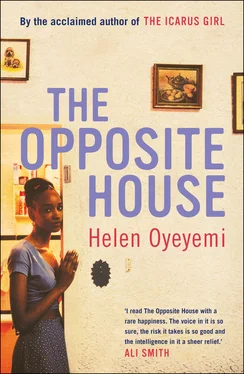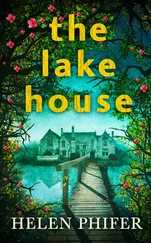Helen Oyeyemi - The Opposite House
Здесь есть возможность читать онлайн «Helen Oyeyemi - The Opposite House» весь текст электронной книги совершенно бесплатно (целиком полную версию без сокращений). В некоторых случаях можно слушать аудио, скачать через торрент в формате fb2 и присутствует краткое содержание. Год выпуска: 2008, Издательство: Bloomsbury UK, Жанр: Современная проза, на английском языке. Описание произведения, (предисловие) а так же отзывы посетителей доступны на портале библиотеки ЛибКат.
- Название:The Opposite House
- Автор:
- Издательство:Bloomsbury UK
- Жанр:
- Год:2008
- ISBN:нет данных
- Рейтинг книги:4 / 5. Голосов: 1
-
Избранное:Добавить в избранное
- Отзывы:
-
Ваша оценка:
- 80
- 1
- 2
- 3
- 4
- 5
The Opposite House: краткое содержание, описание и аннотация
Предлагаем к чтению аннотацию, описание, краткое содержание или предисловие (зависит от того, что написал сам автор книги «The Opposite House»). Если вы не нашли необходимую информацию о книге — напишите в комментариях, мы постараемся отыскать её.
The Opposite House — читать онлайн бесплатно полную книгу (весь текст) целиком
Ниже представлен текст книги, разбитый по страницам. Система сохранения места последней прочитанной страницы, позволяет с удобством читать онлайн бесплатно книгу «The Opposite House», без необходимости каждый раз заново искать на чём Вы остановились. Поставьте закладку, и сможете в любой момент перейти на страницу, на которой закончили чтение.
Интервал:
Закладка:
Yemaya Achabba was as cold and limp and quiet as a fish-scale coat.
Yemaya Oqqutte made eyes at men, and swung her hips lazily; her walk was a trail of sleepy invitation. The men and boys who came to her were the ones who did not know that they wanted to die.
Aya said goodbye to her aspects cheerfully, though they wept and said, ‘Do not forget us, Yemaya Saramagua.’
Besides, Aya’s family is a wild family. They do not need to speak to each other or eat together to know that they are family. They strike each other, curse each other, take fifty-year holidays, but, always, they love.
When Aya’s family came into Cuba on a ship, they brought along with them three young ones from a Dahomey branch of the family who got confused and thought they were invited. They weren’t invited, but it was too late. The Dahomeians had to stick with Aya’s family, and so they discovered their Cuba in the dark, hidden in bigger emergencies, cries of warning as patrol ships tried to intercept the cargo. On arrival, communications arrived from the others; word from Haiti, from Brazil, from Jamaica, from America. Even from England there were some whispers, and then all the talk stopped. The conversations had become too strange. The family’s aspects abroad had changed. It was hard to know what the difference was, but it was there. There were secrets.
When Papa left the Cuba family, he left absentmindedly, shunting a toothpick around his gums, leaving a partly spoken sentence in the air behind him. When he shut the door on his way out that day, the house trembled from roof to basement. Aya knew that Papa wasn’t coming back, not to that house. Aya’s Mama knew it and so did all of Aya’s uncles and aunts.
Mama’s friend Echun, with his matted hair and his red and yellow striped cap, he was disgusted at being mistaken by the Spanish for a harmless baby. The Holy Child of Atocha was rosy-cheeked and dimpled and couldn’t drink as much palm wine and aguardiente as Echun would have liked. Echun went to Mama in her room, and all the flames wavering in the eyeholes of her masks shrank for fear of mischief being made upon them. When Echun wanted to shout, he stood up very straight and half closed his eyes. The first thing he asked Aya’s Mama was: ‘Why am I now called Elegua?’ Mama had no answer.
Echun asked, ‘And why have those three jokers from Dahomey started to speak Spanish? Are they Spanish? Are they Cuban? I don’t want to see those chattering Dahomeians. Same faces, different talk — it smells bad to me. If I could, I would kill them. At least that would be a change.’
Mama said only, ‘Echun. You always say more than you mean.’
Echun embraced her before he uncorked a bottle of palm wine and swaggered out of the door. He went down to meet his friend Anansi, a recent acquaintance, a stick-man with a pot belly and a beady-eyed grin. Anansi kept forgetting and calling Echun ‘Elegua’, but that was all right as long as they were leaving.
Aya’s Uncle Iku laughed and clapped his hands to hear that Echun was gone — he had little love for Echun. Once, for a joke, Echun had cut Iku up and scattered him all over the universe. When Mama told Aya about this, Aya said, ‘Mama, are you lying?’
Her Mama would only say, ‘Yeye, what followed was the most important treasure hunt ever.’
Ochun was the most beautiful of Aya’s family, the one with the gentlest voice. She suffered secret agonies over the drab garb that her counterpart, Our Lady of Mercy, wore in portraits. Strangenesses came to Ochun: it seemed to her that Our Lady of Mercy came into her bedroom as the night breeze flapped her muslin curtains, and tried to throttle her while she slept. Ochun told no one of this. But she left the Regla house soon after Echun did, taking nothing but the short bubi she stood up in and the five bright silk scarves that criss-crossed her waist.
And the three Dahomeians, finding that no one would speak to them and that everyone disdained them, spoke amongst themselves in Spanish until they painstakingly relearned Yoruba. They were two males and a female, and there were no more of their kind since they came from a small, proud land whose borders were smudged away by time’s white thumb. The Dahomeians had no aspects abroad. They had learnt Spanish because they could not afford to forget or to stop speaking, but no one could see that. No one in Aya’s family, not even gentle Mama, remembered to pity the Dahomey folk. This the Dahomeians could not forgive. Once they had relearned Yoruba to their satisfaction, they left the house too.
Nobody asked after the Dahomey folk, though the family searched high and low for Ochun who did not normally leave home just like that.
Then, one night, it happened to Aya too. She tried to lie down and sleep there, in her father’s house, but she couldn’t lie down.
Midnight boomeranged ten thousand times in the space of a second, and night slammed shut to stop day from even beginning to point out a path to the sky’s rim.
Ensoulment is never imagined as the cold terror that it is.
Snuffling, Aya packed before she knew that she’d done it.
She fled to be born. She fled to be native, to start somewhere, to grow in that same somewhere, to die there. She didn’t know just then that she wasn’t quickening towards home, but trusting home to find her.
Only Aya was to find the three Dahomeians. Only Aya was to discover what had become of Ochun and Echun. She found Ochun with her waistful of silk scraps, Echun with a guarded smile and drawers full of stubborn prayers. But by the time Aya found the Dahomeians, and by the time she found Ochun and Echun, she could not recognise them, and she did not know them by name. That is what aspects are like; they change.
6 let no pebble smile
Amy Eleni said dinner at her house was stressful. We hung around in her room and ate crap most of the time, but Amy Eleni only ever invited me to dinner once. Her parents’ house smells of church incense and is full of things like jade vases and brushed suede. It’s the sort of place where you periodically flinch, not because anyone’s raised a hand to you, but because you realise that there are things on display that many would consider worth more than you.
At the dinner table, Amy Eleni’s parents sat opposite us and said little. The silence wasn’t unfriendly, just the kind of silence that happens when there’s nothing new to say. The food was dizzying: lamb cooked in three different ways and spices; cracked wheat; meatballs; hot flatbreads. But Amy Eleni’s dad was the only one who dared to eat much. The problem was Despina, Amy Eleni’s mother, who sat completely still with a brocade shawl draped around her sharp shoulders and let no food pass her lips. Amy Eleni’s father sopped up the quiet with one arm around the back of Despina’s chair, humming more appreciatively the deeper he got into his heaped bowl. How could he eat?
Despina is so thin that you stare helplessly at her. And she knows that you can’t believe it, and she drops her heavy eyelids with a smile. Despina is thin like being naked in public — you can see the beginnings of her teeth stamped in her face; you can see them through her skin when her mouth is closed. Despina is like a star, of both the fifties film and the sky varieties — untouchable, but not beautiful. She is startling in a way that really doesn’t exist any more, only able to be present because she is preserved, delayed. Her eyes are Amy Eleni’s, but brighter. Her hair is Amy Eleni’s, but lighter, under better control, pulled back into a smooth wavy fringe and ponytail. Her skin is darker, dark gold.
From across the table Despina stapled our stomachs with a tranquil gaze.
‘Do please have some more of that, I see you like it,’ and so on.
Читать дальшеИнтервал:
Закладка:
Похожие книги на «The Opposite House»
Представляем Вашему вниманию похожие книги на «The Opposite House» списком для выбора. Мы отобрали схожую по названию и смыслу литературу в надежде предоставить читателям больше вариантов отыскать новые, интересные, ещё непрочитанные произведения.
Обсуждение, отзывы о книге «The Opposite House» и просто собственные мнения читателей. Оставьте ваши комментарии, напишите, что Вы думаете о произведении, его смысле или главных героях. Укажите что конкретно понравилось, а что нет, и почему Вы так считаете.












